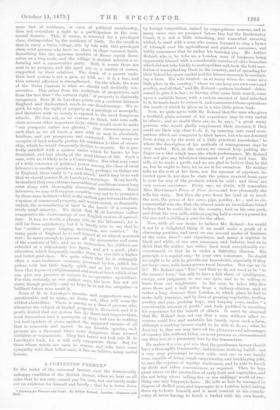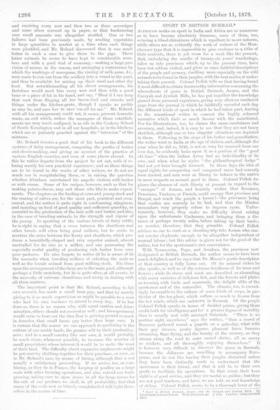A CONTENTED FA.RMER.*
IN the midst of the universal 'lament over the irretrievably unhappy condition of the British farmer, when we hear on all sides that he not only cannot pay his rent, but can barely make out an existence for himself and family ; that he is borne down
* Farming for Pleasure and Profit. By Arthur Roland. London : Chapman and Salt
by foreign competition, ruined by unpropitious seasons, and in many cases sees no prospect before him but the Bankruptcy Court, it is not a little refreshing, and somewhat amusing withal, to meet with a man who comes forward to sing a hymn
of triumph over his agricultural and pastoral successes, and
boldly announces that he makes his farming pay. Mr. Arthur Roland, who is, he tells us, a London man of business, being apparently blessed with a considerable number of olive-branches which did not take kindly to metropolitan soil, took the bold reso- lution of transplanting them to the country, and of spending for their behoof his spare capital and his leisure moments in conduct- ing a farm. His wife wanted—as so many wives do—some nice little place in the country, " where we can keep our own cows and. poultry, and all that," and Mr. Roland—pattern husband—deter- mined to give it to her ; so having, after some little search, come upon a suitable house, with a certain amount of land attached to it, he made haste to secure it, and commenced those operations the result of which he gives us in a nice little green book.
Now, we quite agree with Mr. Roland that the man who gives a truthful, plain account of his experience may be very useful to others ; and no doubt there are, as he says, " a great many persons who would gladly supplement their incomes, if they could see their way clear to do it, by entering into rural occu- pations which are congenial to their tastes, but who are deterred from doing so by the want of a little practical knowledge," to whom the description of his methods of management may be very useful. But, at the outset, we cannot help putting the finger on a blot which mars the whole performance. Mr. Roland does not give any tabulated statement of profit and loss. He tells us he made a profit, and we are glad to believe that he did so, but he ought to have let us see it for ourselves. He neither tells us the rent of his farm, nor the amount of expenses in- curred upon it, nor does he state the prices received from year to year for any of the products which he sold; and these are very serious omissions. Every one, no doubt, will remember Miss Martineau's Farm of Four Acres, and how pleasantly she tells her story. But then she puts down her land at so much the acre, the prices of her cows, pigs, poultry, &c. ; and so cir- cumstantial was she, that she almost made an incredulous friend believe that he could live in the country, feed on his own pork, and drink his own milk, without paying half-a-crown a pound fox. the one and a shilling a pint for the other.
Now, with all our desire to believe Mr. Roland—for would it not be a delightful thing if we could make a profit of a charming pastime, and carry on our several modes of business at the same time P—sad experience, and many a register in black and white, of our own successes and failures, lead us to think that the author has either been most exceptionally cir- cumstanced, or that he is under a flattering illusion. His principle is a capital one,—be your own consumer. No doubt we ought to be able to provide our households, especially if they are large ones, with home-grown rural luxuries. But can we do- it F M r, Roland says " Yes," and that we do not need to be " to the manner born," but only to have a fair share of intelligence,. energy, and judgment, to use our eyes, and to be willing to learn from our neighbours. In his case, he takes fifty-five acres three and a half miles from a railway-station, and at rather a long distance from London, to which place he had to, make daily journeys, and by dint of growing vegetables, feeding poultry and pigs, growing hops, and keeping cows, makes " a considerable amount of profit," and feels justified in recording his experience for the benefit of others. It must be observed that Mr. Roland does not say that a man without other re- sources could live and maintain his family upon such a farm, although a working farmer ought to be able to do so ; what he does say is, that one may have all the pleasures and. advantages of country life, without being, as most persons so circumstanced say they are, at a pecuniary loss by the transaction.
He makes it a slue quei UM that the gentleman-farmer should have a thoroughly trustworthy, industrious working bailiff—not a very 'easy personage to meet with--and one or two handy men, capable of doing rough carpentering and bricklaying jobs, to save the expense of regular tradesmen, and be able to knock up sheds and other conveniences, as required. Then he lays great stress on the production of early fruit and vegetables, and the not being above selling five or ten shillings' worth of any- thing one may happen to have. He tells us how he managed to dispose of shelled peas and asparagus to a London hotel, taking them up to town himself, and is most comical in his compla- cency at never having to touch a basket with his own hands, and receiving every now and then two or three sovereigns and some silver screwed up in paper, so that huckstering over small amounts was altogether avoided. One or two failures had been previously made, by sending vegetables in large quantities to market at a time when such things were plentiful, and Mr. Roland discovered that it was much better in such a. case to give them to the pigs. These latter animals he seems to have kept in considerable num- bers and with a good deal of economy,—making a large pro- vision of acorns in the season, and arranging a contrivance by which the washings of saucepans, the rinsing of milk-pans, &c., were made to run out from the scullery into a vessel in the yard, and thus be available for mixing up their meal and other dry food. But notwithstanding all his clever arrangements, his factotum would meet him every now and then with a good bone or a piece of fat in his hand, and say, " Blest if I can keep that cook from flinging all her bacon-rind and crumbs and things under the kitchen-grate, though I speaks as perlite as may be, and axes her to save 'em all for me." Mr. Roland, with all his management, could not, it seems, prevent domestic waste, an evil which, unless the managers of those establish- ments are very much maligned, is as rife in the Cookery School of South Kensington and in all our hospitals, as in the kitchens which are so jealously guarded against the " intrusion " of the mistress.
Mr. Roland devotes a good deal of his book to the different systems of dairy management, comparing the profits of butter and cheeSe-making, and giving an account of the practice of various English counties, and even of some places abroad. In this he rather departs from the project he sot' out, with of re- lating merely his,own practical experience ; and as these things are to be found in the works of other writers, we do not see much use in recapitulating them, or in raising the question whether Abraham entertained his angelic visitors with butter or with cream. Some of his recipes, however, such as that for making potato-cheese, may suit those who like to make experi- ments. The chapters on the feeding of cows and young stock and the rearing'of calves are, for the most part, practical and econ- omical, and the author is quite right in condemning stinginess, 41nd insisting on food of good quality and sufficient quantity, as essential to the production of-the best milk and butter, and also, in the case of breeding animals, to the strength and vigour of the young. In speaking of the various breeds of dairy cattle, he is right in saying that a cross between the shorthorn and other breeds will often bring good milkers, but he omits to mention the cross between the Kerry and shorthorn, which pro- duces a beautifully-shaped and very superior animal, almost unrivalled for its size as a milker, and one possessing the especially useful quality of producing rich butter from very poor pastures. He also forgets to notice (if he is aware of it) the necessity when breeding milkers of selecting the male as well as the female animal from good milking stock. His ideas upon the arrangement of the dairy are in the main good, although perhaps a little crotchety, but he is quite alive, at all events, to the necessity of extreme cleanliness and nicety in dealing with all these matters.
The important point is that 'Mr. Roland, according to his own account, has made a small farm pay, and that by merely giving to it as much supervision as might be possible to a man who had his own buSiness to attend to every day. If he has -done so, there is no reason why, with equal caution and deter- mination, others should not succeed as well ; and his-experiment would seem to bear out the idea £hat is gaining ground so 111110/1 in America, that small farms pay better than large ones. It is certain that the nearer we can approach to gardening in the -culture of our arable lands, the greater will be their productive- ness ; and in a small country like our own, it would probably be much wiser, whenever possible, to increase the number of small proprietorS, whose interest it would be to make the most of their land., The difficulty about expensive implements might be got over-by clubbing together for their purchase, or even, as in Mr. Roland's ease, by means of hiring, although that is not usually a satisfactory proceeding. If we arrive, too, at eoni Lining, as they do in France, the keeping of poultry on a large scale with other farming operations, and also extend our fruit- growing, taking care to open stores in all the large towns for the sale of our produce, we shall, in all probability, find that many of the evils now so bitterly complained of will right them- selves in the course of time.

































 Previous page
Previous page